Meet Author Jenny Pavlovic and Reading Dog Chase
Reading, Book Signing & Turkey Notes

Author Jenny Pavlovic will read from her books 8 State Hurricane Kate and the Not Without My Dog Resource & Record Book, and share her Chicken Soup for the Soul stories. Meet rescued library dog Chase of the story ‘Teacher in a Fur Coat’. Learn how to write turkey notes and start a new Thanksgiving tradition! The reading will include the story ‘Turkey Red, Turkey Blue’ and a short lesson on crafting turkey notes.
Jenny will sign books at special holiday prices. Profits will be donated to WhiteOwl Animal Sanctuary, the only animal sanctuary on the Pine Ridge reservation in South Dakota. Books available include 8 State Hurricane Kate, The Not Without My Dog Resource & Record Book, the following Chicken Soup for the Soul books: The Wonder of Christmas, The Dog Really Did That?, The Empowered Woman, The Best Advice I Ever Heard, and more.
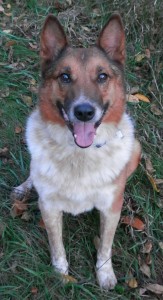
Saturday, November 10 – 2:00-3:30 pm
Common Ground, 2644 Branch Street, Middleton, WI
Monday, November 12 – 6:30 to 7:30 pm
Rosemary Garfoot Public Library , 2107 Julius Street, Cross Plains, WI
Sunday, November 18 – 2:00-4:00 pm – Reading at 2:30
Nutzy Mutz, 555 S Midvale Blvd, Madison, WI (just Jenny)
Posted on October 31st, 2018
Filed under: Calendar of Events, Events, General | No Comments »
----------------------------------------------------------------
I thoroughly enjoyed talking with Amy Newmark on the Chicken Soup for the Soul ‘Friend Friday’ podcast. We discussed my stories, “Changing More Than Diapers” in the Empowered Woman book, about my experiences as an engineering student and coming full circle as an engineering professor, and “Teacher in a Fur Coat” in The Dog Really Did That?, about my library dog Chase, who has survived cancer twice, has saved my life, and helps kids learn to read at the local library. Click here and turn up your sound to listen!
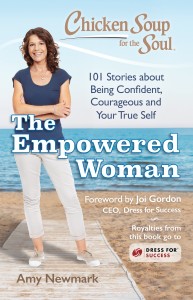
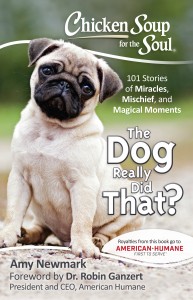
Posted on June 4th, 2018
Filed under: Adopted, Cancer, General, Kate's Family, Library Dogs, READ Dogs, Therapy Dogs | No Comments »
----------------------------------------------------------------
I feel like in some ways I lost my mom in 2017, although she is still here. On March 24th she turned 80 years old and I was visiting my parents to celebrate her birthday. The following morning she fell and hit her head. I didn’t know she had fallen. Although my dad helped her get up, he didn’t see her fall and didn’t know she had hit her head. She seemed ok at first, but I could tell she was having memory problems.
The following day she blacked out in a restaurant and then spent 3 days in the hospital for tests and observation. Nothing significant was found, although I learned that she was on a blood thinner and if you hit your head while taking a blood thinner, you are supposed to get treatment immediately.
Although no specific diagnosis was forthcoming, my mom changed immediately. She had always planned and kept the calendar. She had always paid bills. She had used email regularly. She had kept people in the family up-to-date on others in the family. Seemingly suddenly, she lost much of her short-term memory and couldn’t remember to keep plans. She forgot whether she’d written a check or not. She forgot how to call me and use email. She stopped using email, and would get confused when trying to call or answer the phone. She seems to have regained the ability to answer though. My dad was thrown off because things she had kept track of for 60 years were not happening any more. He has gradually stepped in and taken over keeping track of some things.
Although changes in my mom seemed abrupt, she still has a sweet essence and doesn’t worry about things that used to concern her. She has always been an avid bird watcher, which sometimes drove us crazy when we were kids. A few months ago I saw a large bird and asked her about it over the phone. We ended up both getting out our bird books, and consulting the same book (she had given me my copy). We determined that it must have been a juvenile golden eagle. When I learned that Chase had cancer again and I was struggling over Thanksgiving weekend to determine the best plan for him, Mom said unhesitatingly that of course I should go ahead with the surgery to help him. In the past she might have cautioned me about spending the money, but she got right to what was most important and said I had to do that, didn’t I?
I think the changes in my mom have been hardest for my dad because I’m sure he did not expect to outlive her and certainly didn’t expect to outlive her sharp mind. But I have found ways to connect with my mom these past few months. Her essence and the essence of what is important are still there, even if the ability to perform mundane tasks or busywork are not. Funny how that bird watching hobby that bugged us when we were kids now seems like one of the best ways to connect! It also bothers Mom when she realizes she has forgotten something. We try to be kind about it and help her. Sometimes you have to roll with what you are left with and we are finding ways to do that.
Posted on December 31st, 2017
Filed under: Canine Cancer, General, Memory Loss | No Comments »
----------------------------------------------------------------
Chase’s and my story, Teacher in a Fur Coat, appears in the new book Chicken Soup for the Soul: The Dog Really Did That! Our story will be featured on the Chicken Soup for the Soul podcast on October 9th and will continue to be available once it airs.
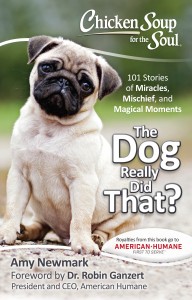
Click here to read the story.
Click here to listen to the podcast. Chase says, “Thanks for listening!”

Posted on October 6th, 2017
Filed under: Canine Cancer, Dogs and Health, General, Library Dogs, Puppy Up!, READ Dogs | No Comments »
----------------------------------------------------------------
On a Saturday morning when I took the dogs to the state park, I noticed an elderly man sitting in front of the gas station with a pile of duffle bags and knapsacks. When I went by again in the afternoon, almost 3 hours later, he was still there. He didn’t have a sign. He didn’t appear to be asking for anything. He was just sitting there by the road. The third time I saw him, I was on my way to the grocery store. I saw my neighbor talking to him. I decided to get him a sandwich and ask him if he was trying to get somewhere.
On my way back home, I stopped and introduced myself, told him I was from the neighborhood, and asked him if he needed a ride somewhere. He said he was trying to get to Sauk City, WI, which is west of town, or find a place with a reasonable hotel. I had been planning to go to Stoughton that afternoon to visit my folks, but that’s south of town, in another direction. He declined the sandwich and a drink. I told him I don’t know Sauk City that well, but that I’d talk to my neighbor and come back in a while.
When I headed home, I learned that my neighbor wasn’t home. Rats! I thought about getting the guy a taxi, but that would probably cost a fortune. The hotels that I know in the area are business hotels and are pretty expensive. Besides, he seemed to be trying to get to Sauk City. I checked the map and realized that it’s only about a 20-minute drive, so I pondered offering him a ride myself.
Could this elderly gentleman be part of a set-up? Could he be a danger to me? I thought of all the things that could go wrong. And then I thought, what if he’s just a busted up old man who is trying to get to a safe place and he just needs a ride? He’d been sitting there for hours. Probably hundreds of people had driven by.
I decided to offer him a ride to Sauk City. It would take about 20 minutes to get there, and then he’d be off the street. When I arrived back at the gas station, he didn’t see me arrive. So I went inside and asked the clerk if he knew anything about the guy. He said he knew absolutely nothing. I texted my sister and told her what I was doing, so somebody would know where I was going.
Then I went back out, drove over by the old man, and told him that if he trusted me and his things would fit in my back seat, I was willing to give him a ride to Sauk City. He accepted my offer and then we spent a few minutes dismantling all of his bags from his luggage rack and loading them into my truck. I realized that he probably had all of his belongings with him and his load was quite heavy. He was tall and thin with a rough gray beard, and his clothes hung off him, somewhat like a scarecrow. His load would have been heavy even for a much younger, stronger man.
I told him that I don’t know Sauk City well, other than the part along Highway 12, so he’d have to direct me. That’s when things got interesting. I’d thought he was trying to get to someone or someplace specific in Sauk City, but he hadn’t been there before, was just going there because someone had recommended it to him. He was looking for an affordable place to stay. So we continued on.
I didn’t know what we’d talk about in the car for 20 minutes, but he started jabbering like someone had put a quarter in him. He was a veteran of the Navy, of the Vietnam War era. He’d been an electrician. He told me of the places he’d been and friends he’d lost while in the Navy. He revealed some very specific memories. His narrative was both fascinating and frustrating because he was talking so fast I couldn’t get half of what he said and I was trying to focus on our mission of finding him a place to stay. He had seen and done a lot in his many years. I wondered to myself how a U.S. veteran had ended up traveling that way with all of his belongings. I wondered where he’d been and where he was going. But I knew that merely giving someone a ride didn’t entitle one to know everything about him, just what he cared to share.
As he talked he revealed that he’d started in Pennsylvania, and had been at the airport in Chicago and maybe Madison. He must have flown halfway across the country to end up in Wisconsin. I mentioned that he must have veterans’ benefits (hoping he was taking advantage of them). He said yes, but not again until the 1st and this was the 29th. He had a few days to wait until he got paid again. He said he didn’t want to carry too much cash or he might get robbed.
When we arrived in Sauk City, the first hotel we found told him they had just one room left, one with a Jacuzzi, for $170 per night. Clearly too much. They told him to check farther down the road at a motel, so we did. That motel had a “VACANCY” sign displayed and looked more affordable. There weren’t many cars in the lot, so it looked promising. Yet the guy at the desk turned him away and said they were full. At this point I was starting to wonder if an old black man would be able to find a room in this small town. After all, the “VACANCY” sign was lit. The next place we went, another motel, also turned him away. The guy there told him there was a dog show in town, so they were full up. That might explain why the motels seemed empty. If everyone was at the dog show during the day and came back at night, the rooms could be full. We tried following another “MOTEL” sign, but didn’t find anything. So we started to head back toward Madison, with two more towns to stop in along the way. He nodded off for a while – he must had been really exhausted and felt safe enough to let his guard down for a while. In the first town we only found one motel, which looked nice. But nobody was in the office and a “SORRY” sign was displayed. In the next small town we couldn’t find any places to stay, so we ended up at the Beltline in Middleton again, not far from where we started.
The man had gotten very quiet. He was no longer telling stories of his time in the Navy. I think we were both starting to wonder if we’d find him a place to stay. It was Saturday evening and hotels and motels were filling up. The man told me that a cop had offered him a ride earlier and had mentioned a Road Star motel. I thought I knew where that was, so I headed that direction. The hotels I saw along the way, like a Hilton and a Marriott, were too expensive and I kept going. I thought about him refusing a ride from a cop. I suppose that could be quite a risk for an old black man from out of town. The local deputies I know would genuinely be interested in helping this man, but how could he know he’d be safe with a cop? I asked him where he was ultimately going and he said he’d like to end up somewhere on the west coast. Finally I realized that he had a long way to go yet. But he’d already made it halfway across the country.
By this time our journey had taken way longer than 20 minutes, more like 2 hours. I was starting to wonder if we’d find him a place to stay. I didn’t feel like I could take him home, and I didn’t think he wanted that anyway. I didn’t know of a safe place for him to go if we didn’t find a hotel. I was tired of driving around in the car for 2 hours on a beautiful afternoon. I was getting tired and hungry and cranky, yet I had been through way less than he had. I hadn’t heard back from my mom and needed to let her know that I would visit on Sunday instead. I offered him a snack and he said no thanks. I must have looked pretty discouraged, because he said something like, I bet you’re wishing now that you hadn’t gotten involved. I figured that this may be the most important thing I had done in a very long time, and replied that I wasn’t going to put him back out on the street.
We found the Road Star hotel, which advertised $65 per night. It looked promising, although a little rough. The old man struggled to unfold himself and climb out of the car, as he did every time. He shuffled up to the entrance. Not long after, he came out like someone had lit a fire under him. He said that a black man and a Hispanic man in the lobby had said they were going to kill him. Good grief! I got out of there fast. To my knowledge, this wasn’t a bad part of town, but I didn’t want to take any chances.
I didn’t know where to go next. I don’t have a smart phone. I’d texted my sister and asked her to find a hotel with a vacancy for us, but she had missed the point. The man mentioned a Super 8, probably one that he’d seen on the far east side of town, the other side of town from where we’d started. As we headed east, I saw a Super 8. He wanted to stop there, so we did. He came back out and said they had one room left, and he could afford it, but they required a debit or credit card. He’d told them he was a veteran, which seemed to help. I said maybe they’d take my card, and he urged me to hurry in, as another car was pulling in and he really wanted that room. I thought this could be a scam, but we handled it well. He paid cash for the room. I gave the clerk my credit card as a back-up. They didn’t need to charge anything to my card. She gave him a first floor room.
Next began the massive effort to unload all of his bags and get them to his room. He insisted on carrying some of the bags, which took forever. There were three small steps, and on each step he had to put the bags down to climb up, then pick up the bags again. He was incredibly strong considering his frail appearance, but very slow. He appeared so vulnerable. Although I’ve had issues with my back, knee and shoulder, I felt incredibly young and strong next to him. As we were carrying his things inside, a couple was walking by and asked if we wanted help. He said no. I was glad to see a white woman with a black man being friendly to him.
Once all of his bags were inside, he seemed nervous about having me help carry them into his room. I told him then that I didn’t even know his name. He said it was Melvin, and asked me my name again. I think he’d mentioned his name earlier in the car when he was talking so fast, but I’d missed it. I thanked him for his service and his stories, and wished him well on his journey.
On my way out, I stopped to use the restroom in the lobby. I spoke with the clerk, explained the situation and made sure nothing would be added to my credit card. She understood the situation and reassured me. Then I ran into the couple – the white woman and black man – on the way out. I thanked them for offering to help him and they said they’d keep an eye on him.
And then I prayed for Melvin to have a safe journey and land in the perfect place. I spent a good deal of time thinking about how a U.S. veteran can end up homeless on the street corner with all of his belongings, while hundreds of people drove by, not stopping to help. Melvin seemed to have a lot of pride, and was very self-sufficient, considering. He didn’t want food or water or money from me. Giving him a ride may have helped with what he needed in that moment, but it probably didn’t do much for him in the long run. I hope that just having someone listen and help and care meant something to him. I tried to offer him the help he wanted without overstepping bounds.
I also realized that I need to learn more about available resources for the homeless and veterans in this area. Maybe if I’d known more, I could have helped him more effectively.
This whole experience left me feeling incredibly grateful for all that I have, and at the same time somewhat inadequate as a nation taking care of its veterans.
A few days later, I discovered that the sandwich I’d offered Melvin was still in my fridge. I thought of Melvin and prayed that he was safe and well on his way to where he wanted to be. If you see a lanky old black man by the side of the road with a long fuzzy gray beard and a tall stack of black bags, be kind (maybe offer him a ride). And please tell him Jenny says hello.
Posted on August 6th, 2017
Filed under: General, Need a Home, We Recommend | No Comments »
----------------------------------------------------------------
Please click here to support Chase in the 2018 PuppyUp! calendar contest.
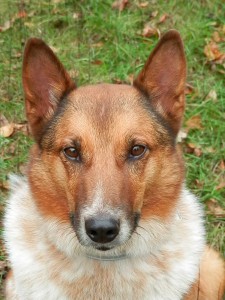
Chase has survived colon cancer for 4 years, and lost his buddy Bandit to multiple myeloma in 2014. I would love to honor Chase and give hope to others by sharing his story in the calendar. I debated whether to enter because votes cost $1 each and the minimum donation is $5. But PuppyUp is such an amazing organization that I decided to enter Chase and help raise money for their work. The Puppy Up Foundation is committed to discovering the common links between canine and human cancers and the causes of these cancers through comparative oncology research. Click here to learn more about PuppyUp! Please read Chase’s story at the link below and consider supporting Chase and PuppyUp! Please share this request. Thank you.
Please click here to support Chase and PuppyUp!
Posted on June 28th, 2017
Filed under: Canine Cancer, General, Puppy Up! | No Comments »
----------------------------------------------------------------
I’ve had the great good fortune to travel to Bimini three times to spend time with wonderful people and swim with wild dolphins. On each trip, I traveled through Ft. Lauderdale International Airport. I experienced it as a rather crowded and stressful place, best endured in the company of friends. I can only imagine how terrified people were during the shootings that occurred yesterday. I’ve been meaning to share a positive story from the Ft. Lauderdale Airport, an experience I had in June. I think this is a good time to share, and hope that this story will encourage others to care for one another. So here it is:
Re-entry into the busy world and the crowded Fort Lauderdale International Airport wasn’t easy. I’d just spent a week with a beautiful group of people and swam in the ocean with wild dolphins. I had enjoyed the peaceful time away with the dolphins and this pod of amazing humans who all took care of one another so well.
When I got to the airport, the airline wouldn’t take my checked bag because they were only checking bags for an earlier flight. The line inside was very, very long and I had to check my bag before I could go through security. A few of my new friends were inside and I wanted to join them as soon as I could, to spend more time together before we flew off to different parts of the country.
I decided to check my bag outside. It was hot and the line was long, but not as long as the line inside. So I stood in line and waited, hoping for a guardian angel to help me along.
The older woman ahead of me in line carried a purse, a carry-on bag and a very large suitcase. I thought she was with the family in front of her, but as she struggled to move her suitcase when the line inched along, I realized she was traveling alone.
After almost thirty minutes of standing in the heat, the woman reached the front of the line. She wanted to check the large suitcase, and the airline employee told her she had to pay with a credit card. She offered cash, but no card. He told her that, without a credit card, she would have to go inside to wait in line again to check the bag. I thought, really? This older woman has waited out here in the heat for thirty minutes, the line inside is even longer, and you’re telling her she can’t check her bag? I had seen no signs indicating that you had to have a credit card.
The woman didn’t speak much English and looked like she didn’t know what to do. I asked the man what was needed. He said that $25 had to be charged to a credit card. I asked him if I could pay it with my card, and he said yes. So I gave him my card to pay her baggage fee. Since I was still in the frame of mind of automatically looking out for one another, I instinctively wanted to help this woman. She was alone, probably far from home, and didn’t have an easy way to communicate.
The woman checked her bag. She thanked me with great sincerity, and we each went on our way.
I could tell that my act of kindness had an effect on the airline employees and perhaps gave them pause to empathize with this woman’s situation. I think God might have winked, and perhaps had orchestrated the whole thing. I breezed through security and joined my friends in the airport for lunch and more time together before we had to part ways.
Later someone asked me, “So the woman paid you in cash and you paid by credit card?” And I said, “No, I just paid her baggage fee.” I hadn’t even thought about asking her for the cash. I was just thinking of taking care of a fellow human being, as people had been taking care of me for the past week.
When the credit card bill arrived a few weeks later, I remembered the woman at the airport and prayed that she’d arrived safely at her destination. I thought it ironic that I had hoped for a guardian angel to help me get through the airport, and thanked God for giving me the chance to be that angel for someone else.
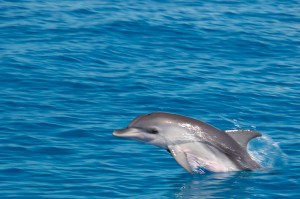
Photo by Atmoji of WildQuest
Posted on January 7th, 2017
Filed under: Dolphins and Whales, General | No Comments »
----------------------------------------------------------------
They have today’s game plan mapped out. On the Pine Ridge and neighboring Rosebud Indian Reservations in South Dakota, this “boots on the ground” group, small enough to sit at the same picnic table, has a list of dogs to pick up from calls that came in over the past couple of days. The plan is in place to cover an area the size of the state of Rhode Island. The group knows that the plan can shift at any moment, and it certainly will if these words are spoken at the other end of the line: “There’s a puppy at the dump.”
A day headed in one direction is now immediately headed in another. Sometimes the team’s conversation on priorities can be complicated when so many calls are coming in on a busy day, and sometimes the decision is easy. A puppy at the dump is Priority One. If the team hears of one late in the day and cannot find it before dark… sleep does not come.
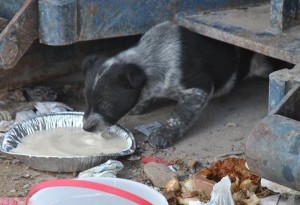
LightShine Canine (LSC) has rescued more puppies (and even large dogs) dumped or stuck in the massive dumpsters after scavenging, than KC can count. Most of the dozen small dumps and landfills sprinkled around the Reservation have housing nearby. Many stray and free-roaming owned animals frequent them for scavenging, and even for socialization, as people come and go throughout the day. Pups follow Mama there, or get brave and head that way on their own, and yes, they are dumped there. On the Reservation, this is akin to putting a baby at the door of the fire station, the best bet they have for maybe, just maybe, someone finding it. On a reservation without an impound or a veterinarian, where many people live in remote areas, this might be the best they can do.
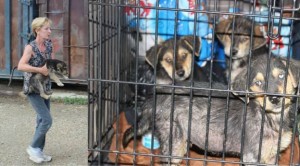
KC Willis first arrived at the Pine Ridge Indian Reservation five years ago to help change the lives of a small group of grandmothers. Since drugs and alcohol were stealing the lives of their grown children, they were raising the next generation. These powerful fabulous women in their 60s, rooted in their land and their culture and their people, became KC’s friends and family.
It was the grandmothers who first began asking KC for dog food…They explained to her how they fed the strays outside the grocery store or on the streets in front of their houses. It was a grandmother who held out a puppy to KC one day and said “Here KC, it’s sick can you help it? Please take it.” And so she did. And then another and then another, until one day KC found herself with a Lakota friend at her side driving the reservation looking for the ones who had no grandmother to pick them up and hand them off.
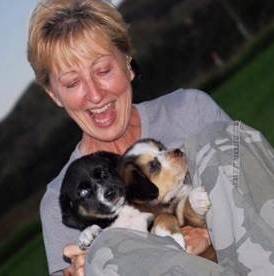
KC didn’t originally go to the reservation to rescue dogs. But with the help of the grandmothers and their request that she do something about a great sadness that walked through their land – thousands of homeless animals who were suffering from over one hundred years of unchecked population growth – LightShine Canine: A Rez Dog Rescue was born.
When KC was criticized for shifting her focus from daily help for the grandmothers to daily help for The Sunka Oyate – The Dog Nation – an elder shook her finger in KC’s face and said “Do not let them tell you that helping the animals isn’t helping the people. You are removing a visible sign of hopelessness from our reservation. We never thought the dog situation could change and we are seeing a change and it gives us hope that if this can change maybe that can change.”
LightShine Canine, a 501c3 non-profit organization, brings the heart of the Lakota and the needs of the dogs together. Their goal is to rescue stray, abandoned, injured and abused dogs on the Reservations, provide them veterinary care, and relocate them to foster-based rescue groups around the country. LSC’s dog rescue work program is geared to ensure that the dogs they rescue and the Lakota who assist with this dream are changed forever. The majority of LSC volunteers and rescuers are Oglala Sioux Tribe members taking ownership of the crisis their animals are in. LSC also offers material and educational support to Lakota families who want to better care for their animals.
Every single day of the year LSC picks up stray dogs (and cats) on the Pine Ridge and Rosebud reservations. They cover a large territory answering calls from communities that can be two hours apart. They visit the housing areas and the country roads and the dumps, taking into their care the animals that need help. They respond to Facebook messages, texts and phone calls from residents young and old who now have hope and help care for animals until LSC can get there. They respond to calls from the Tribe and from police officers about the locations of dogs in need. On their way to picking up strays they come across strays, dogs who were born not belonging to anyone and who would otherwise die not belonging to anyone.
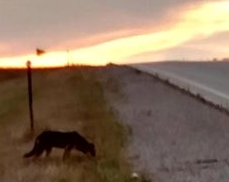
The populations of the two vast Pine Ridge and Rosebud reservations are among the poorest in this country, with no veterinarian inside their borders. The number of homeless dogs is beyond what the community itself can handle, with no animal impound. But last year LSC rescued and relocated over 2,000 dogs from the reservations. In the next decade that will represent tens of thousands who will not be born into suffering. LSC has already rescued over 2,000 dogs in 2016, and expects to rescue 2,600 by year-end. LSC knows they cannot save them all, but still pushes forward with love to make a difference for the ones who are close enough for them to touch.
So when LSC received a call at 10 o’clock on a very cold night from an animal lover who had rescued a puppy from the cold, even though a “no travel advisory” had been issued by the Tribe, LSC worker Pete headed out. With a desire to respond to the needs of his community and a mission to save puppies and dogs one at a time, he drove slowly and surely, and made a difference in one more life. Late that night, he sent out the text, “One male puppy on board… a happy camper”.
When LSC received a call about a pup stuck in a ravine, Pete headed out with a rope and rescued the pup.
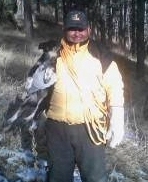
When LSC sees a desperate dog in the middle of nowhere daring to get close to the road to search for food, LSC stops to help the dog. Boots on the ground – Paws off the ground. The dog is safe that night, maybe for the first time in its life.
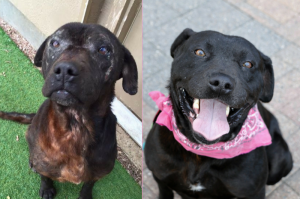
When LSC is asked to help a large dog with a terrible skin condition, they pick her up and take her to one of the veterinarians who work with them to care for dogs who may have never seen a veterinarian before. Months later, a photo of this dog is posted on Facebook. No longer the miserable, hopeless-looking dog with hairless patches and dull eyes, she shows off a glossy coat and looks straight into the camera with a sparkle in her eyes. You have to look twice to make sure this dog with the big grin is the same dog, and indeed she is. Then you see that her foster dad has failed as her foster dad and has become… her Dad. Her forever Dad. Another happy ending.
When LSC has a very dark day because dogs have been lost to car hits, to abuse, and even to parvovirus while being rushed to the vet, they hold the heartbreak close. And then they look into the eyes of the pup on the seat beside them who almost starved to death, and they know she is safe. They whisper farewell to the ones they lost, sit up a little straighter in their seats, and with determination and a glance at the face next to them, they say, “Paws off the ground.” Today is a new day.
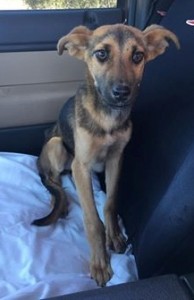
To quote KC, “If we as Rescue do not make a difference in the lives of the animals that cross our path…If we do not show the children what it looks like to step in for the innocent…If we do not honor the elders who fear for an animal’s safety…if we walk away from that because we don’t feel we can ever cross some kind of Finish Line…then we are running the wrong race and we have made it about us. It is not about us accomplishing something. It is about not turning away from something that must be done.”
And to quote KC again, “The stray dogs of Native American reservations across this country are the invisible dogs of America. But they are not invisible to LightShine Canine, and now they are not invisible to you.”
With winter coming, LSC is working furiously to help as many dogs (and cats) as possible.
Follow the daily rescue efforts of LSC on Facebook and visit the LSC fundraising page
LSC relies on donations to pay most of the gas and veterinary bills for the animals they rescue. You can donate via the following methods:
Wopila!
Posted on September 30th, 2016
Filed under: Adopted, General, We Recommend | No Comments »
----------------------------------------------------------------
The video showed houses submerged in brown water, with neighborhoods vacant and almost unrecognizable. A dog struggled to stay afloat in his outdoor run as a man in an LSART shirt reached in to rescue him. With the 11th anniversary of Hurricane Katrina just days away on August 29th, these images looked all too familiar. But this flood occurred in August of 2016, many miles inland from the Gulf coast.
Entire neighborhoods in the Baton Rouge and Denham Springs, Louisiana area were underwater. This is where many of the rescued animals were taken after Hurricane Katrina, to keep them safe and dry on high ground until they could be reunited with their families. Ironically, in 2016, relentless rains were now forcing people and their pets out of their homes, people who had given countless hours to help care for the animals rescued after Hurricane Katrina, people who never thought this would happen to them.

One woman, Nancy from Denham Springs, volunteered at the Lamar Dixon Expo Center in Gonzales, LA after Hurricane Katrina. I met her there in September of 2005 while helping take care of rescued animals. She watched out for 8 State Hurricane Kate, and helped with several cattle dog rescue efforts in the years since. Nancy and her family lost everything to the August 2016 flooding. Fortunately, their entire family, including people and animals, got out safely. But they lost their home and did not have flood insurance since they lived in an area that had never flooded before.
The 2016 flooding in such an unlikely area reminds me how important it is to share what I learned from Hurricane Katrina, because nobody thinks such a tragedy will happen to them. The Not Without My Dog Resource & Record Book is my determined effort to help keep people and their pets safe (learn more at http://www.8statekate.net/wordpress/?page_id=1542). This book shares vital information that I learned from caring for rescued animals in Louisiana after Katrina, and working to reunite lost animals with their families.
Do you have a disaster plan for your family, including your pets? Do you know what you would take and where you would go if you had to evacuate from your home on short notice? Do you have enough vehicles and drivers to transport all the family members, including people and pets, in your care? Do you know what precautions to take to prevent your pets from getting lost, and to help you find them if they go missing? Making a simple plan can prepare you well and provide peace of mind. The Not Without My Dog book walks you through the process… because a fire or a flood or a tornado could happen to you.
The following information will help you prepare:
Microchip your pet. In the aftermath of Hurricane Katrina, we learned how easily pets can lose their collars and ID tags. A microchip implanted under the pet’s skin is the best permanent identification, and is recommended even if your pet never leaves the house. A flood, tornado, hurricane, or even a surprise bolt out the door could separate you. A microchip is a small electronic chip with a unique ID number, in a capsule the size of a grain of rice. When a pet is found, the ID number is read by a hand-held scanner moved over the pet’s back, and the microchip company is notified. The company looks up the ID number in their database to find the owner. A microchip will only reunite you with your pet if you’ve registered your current contact information with the manufacturer of the chip. Microchip technology has improved over the past ten years. A universal scanner is now available that can read the microchip number from any manufacturer.
Keep good pet records, including a current photo of you with your pet (to verify ownership) and photos of your pet’s unique identifying markings and characteristics. Store your pet’s vet, food, and medication records in one place (like The Not Without My Dog Resource & Record Book). Include information on your pet’s daily routine, words your pet knows, and other useful tips for anyone taking care of your pet in an emergency situation. Make sure a designated person knows where your pet’s information is stored, in case something happens to you. Print the photos of you and your pet; don’t rely on photos stored on your phone, which won’t be accessible if power is lost.
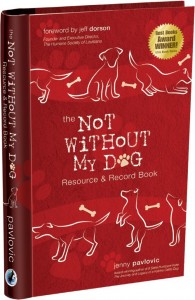
Make a disaster plan for your family and pets. Learn about the most likely natural disasters in your area. If you must stay home in a disaster situation, be prepared to survive without assistance. Assemble a kit to meet your family’s basic needs for at least three days. Store it in easily accessible waterproof containers. If you must evacuate, do not leave your pets behind. Keep carriers, leashes, and harnesses for your pets. Know the local evacuation routes, how you’ll transport your pets, and where you’ll take them. Plan alternate destinations because emergency shelters for people often don’t allow pets, and pet-friendly hotels fill quickly.
Socialize and train your pets. Positively trained pets are less likely to get lost. Help your pets learn to be confident in different situations. Make sure they know how to walk on a leash/harness and are comfortable riding in their carriers in the car. Teach them to wait before exiting the car by pausing, then giving them a reward. I feed my cat in her carrier twice each day. Since she’s used to going in the carrier regularly, I could easily load her into it on short notice if needed. I’m also teaching her to be comfortable wearing a harness.
Learn more and help flood victims in Louisiana by reading the Not Without My Dog Resource & Record book, on sale for $15 each. Through September 30th, $5 per book sold will be donated to help human and animal victims of the August flooding in Louisiana (Click here to learn more and look inside the book. Click here to order). Help fulfill my dream of keeping people and their pets stay safe by educating those who purchase the book, and help those who have been affected by the floods. Thank you for your support!
Posted on September 6th, 2016
Filed under: General, News, NOLA, Not Without My Dog | No Comments »
----------------------------------------------------------------
The subject line stopped me in my tracks, “My Experience with Tony (“Mountain Man”) and His 31 Dogs”. Tony… Mountain Man. It had to be him! The first line of the article mentioned that Tony had been living deep in the woods of Natchez Trace State Park in Tennessee. My heart skipped a beat.
The email message was from Scotlund Haisley of Animal Rescue Corps, who said that in January they had completed five rescue missions in Tennessee. Scotlund remarked that he had found himself reflecting again and again on one rescue of the five that was not their usual case. He said, “This was an unusual experience and I wanted to share more with you.” ARC’s regular mission is to help shut down large-scale cases of animal cruelty and neglect in which individuals are profiting from animal suffering. However, “Mountain Man” Tony’s situation was different. ARC was able to offer a lasting solution to a person and dogs who desperately needed help.
Tony had been living in the wilderness of Tennessee for 16 years, with his pack of dogs. A group of people who had gotten to know him and had offered to care for him as he faced health issues had contacted ARC for help. They requested that ARC receive, provide veterinary care, and find homes for all 31 of Tony’s dogs because Tony wouldn’t accept the home and health care that he needed until he knew the dogs were well taken care of too. Scotlund described Tony as having a “strong-willed head and a soft heart”. Tony cared deeply for his dogs, and ultimately loved them enough to let them go, to get the veterinary care they needed and find families who would give them individual attention.
Scotlund described meeting Tony, building trust with him, and watching as Tony howled and his dogs came out of the woods from all directions, “surrounding him with a visible loyalty”. When I saw this on a video, my eyes brimmed with tears as I watched the pack with many red and gold dogs appear. I knew then that this was the same Tony, the name that I remembered from a few years ago. During the summer of 2007, a litter of seven red and gold pups had been taken in by the Henderson County Humane Society in Tennessee. Deb and her family nursed the pups to health after they almost died from coccidia. Eventually I was contacted for help through the cattle dog network. When I asked where the pups came from, Deb said that they were from a man named Tony in the Tennessee wilderness.
Cay and Her Puppy Littermates
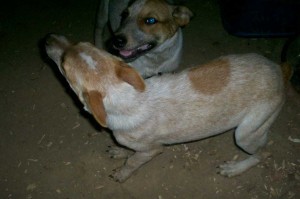
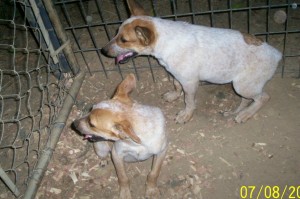
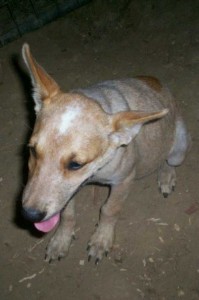
Tony! There he was on the video. And there they were – Cay’s wild family! You see, in 2007 one of those red and gold pups from Tony eventually came to rescue in Minnesota. And one of those gold pups eventually came to live with me and became my girl Cayenne… Natchez Trace Cayenne. She was afraid of just about everything when I first met her, a true pup of the wilderness. If you’ve been reading along, you know how far Cay has come since she was a scaredy pup back in 2007 (read more), when she was afraid to be touched, and was easily overwhelmed by loud noises and activity around her.
Adolescent Cay
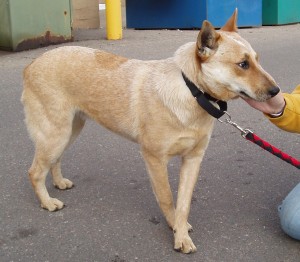
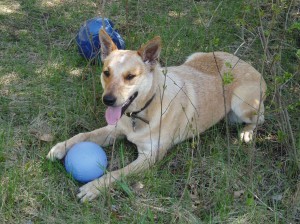
Over the years I’ve come to believe that Cay is part Australian Cattle Dog and part Carolina Dog (a feral breed in some southern states), that perhaps her feral mama dog mated with someone’s farm dog. Cay’s sister Rose looks more like a purebred red Australian Cattle Dog and Cay herself looks very much like a golden Carolina Dog. In that video of Tony and his pack, I saw several familiar-looking red and gold dogs. Now I understand much better where Cay’s litter came from and why so much of the world was intimidating to them. I see that probably both parents were wild dogs of the peaceful woods, and that Tony likely saved the pups’ lives by getting them the care they needed to survive coccidia.
Rose Cay
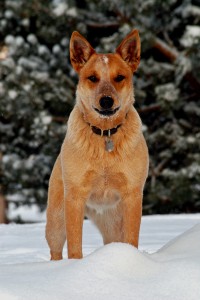
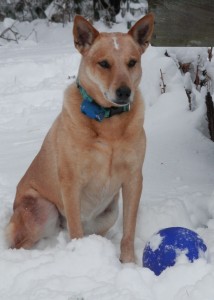
I think about Tony living in the woods with his dogs, and how peaceful it would be to live in the wilderness. If you’ve ever wondered where your rescued dog came from and why s/he behaves the way s/he does, you will understand how fulfilling it was for me to see the video of Tony and his dogs, how emotional it was for me to see the place Cay came from as a pup and the man who saved her life… to have a few more pieces of the puzzle that is Cay, my girl who has come so far. To know that this man of very little worldly means loved Cay and her littermates enough to get them the care they needed, even though he did not have the means to provide it himself.
In our society, it’s unusual to live away from other people with a pack of dogs in the wilderness. But something drove Tony to do this and his privacy has been respected. We might not think we have a lot in common with him, but certainly our love of dogs is a powerful bond. He did what many of us try to do for animals in need, love them and provide them the best life possible. I’m grateful that people reached out to Tony and are helping him get the care he needs too.
I plan to write Cay’s story for Tony and send him pictures of her over the years, to thank him for my beautiful girl. Perhaps we’ll even take a road trip to Tennessee to visit Cay’s birthplace. I am especially grateful to Deb and her family of the Henderson County Humane Society. They cared for the pups in a way that Tony couldn’t, saved their lives and helped them find their forever homes. I’m also grateful to Homeward Bound Rescue of Minnesota and Meet the Pack Cattle Dog Rescue of Ontario for each taking three of the pups in and adopting them into their forever homes. Although sometimes it really does take a village, many times it takes several.
Cay All Grown Up
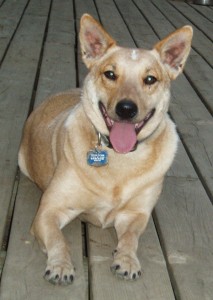
Posted on July 18th, 2016
Filed under: Adopted, Cayenne/ Zulu, General | No Comments »
----------------------------------------------------------------























